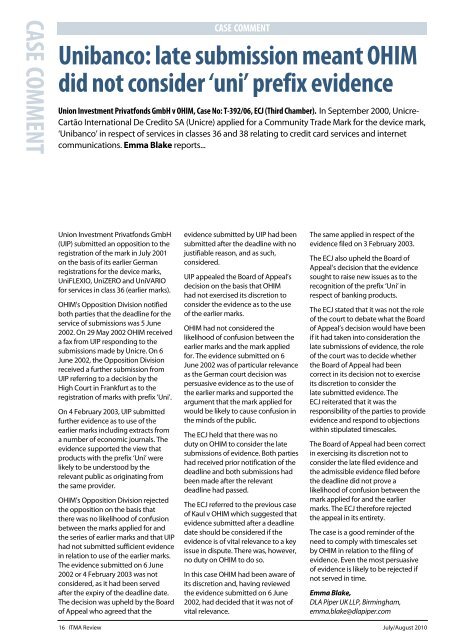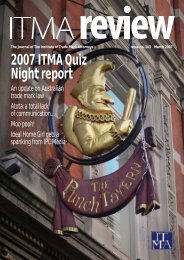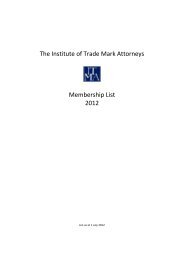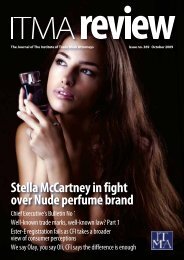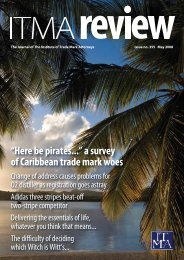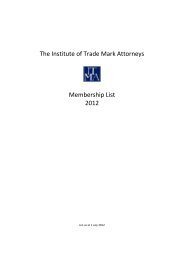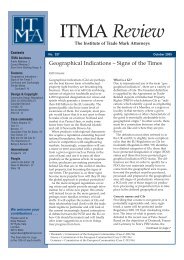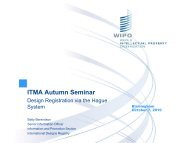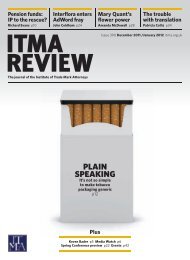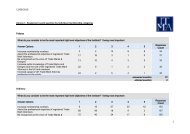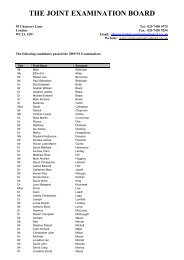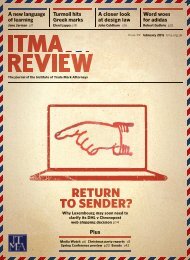case comment - ITMA
case comment - ITMA
case comment - ITMA
You also want an ePaper? Increase the reach of your titles
YUMPU automatically turns print PDFs into web optimized ePapers that Google loves.
CASE COMMENT<br />
CASE COMMENT<br />
Unibanco: late submission meant OHIM<br />
did not consider ‘uni’ prefix evidence<br />
Union Investment Privatfonds GmbH v OHIM, Case No: T-392/06, ECJ (Third Chamber). In September 2000, Unicre-<br />
Cartão International De Credito SA (Unicre) applied for a Community Trade Mark for the device mark,<br />
‘Unibanco’ in respect of services in classes 36 and 38 relating to credit card services and internet<br />
communications. Emma Blake reports...<br />
Union Investment Privatfonds GmbH<br />
(UIP) submitted an opposition to the<br />
registration of the mark in July 2001<br />
on the basis of its earlier German<br />
registrations for the device marks,<br />
UniFLEXIO, UniZERO and UniVARIO<br />
for services in class 36 (earlier marks).<br />
OHIM's Opposition Division notified<br />
both parties that the deadline for the<br />
service of submissions was 5 June<br />
2002. On 29 May 2002 OHIM received<br />
a fax from UIP responding to the<br />
submissions made by Unicre. On 6<br />
June 2002, the Opposition Division<br />
received a further submission from<br />
UIP referring to a decision by the<br />
High Court in Frankfurt as to the<br />
registration of marks with prefix ‘Uni’.<br />
On 4 February 2003, UIP submitted<br />
further evidence as to use of the<br />
earlier marks including extracts from<br />
a number of economic journals. The<br />
evidence supported the view that<br />
products with the prefix ‘Uni’ were<br />
likely to be understood by the<br />
relevant public as originating from<br />
the same provider.<br />
OHIM’s Opposition Division rejected<br />
the opposition on the basis that<br />
there was no likelihood of confusion<br />
between the marks applied for and<br />
the series of earlier marks and that UIP<br />
had not submitted sufficient evidence<br />
in relation to use of the earlier marks.<br />
The evidence submitted on 6 June<br />
2002 or 4 February 2003 was not<br />
considered, as it had been served<br />
after the expiry of the deadline date.<br />
The decision was upheld by the Board<br />
of Appeal who agreed that the<br />
16 <strong>ITMA</strong> Review<br />
evidence submitted by UIP had been<br />
submitted after the deadline with no<br />
justifiable reason, and as such,<br />
considered.<br />
UIP appealed the Board of Appeal’s<br />
decision on the basis that OHIM<br />
had not exercised its discretion to<br />
consider the evidence as to the use<br />
of the earlier marks.<br />
OHIM had not considered the<br />
likelihood of confusion between the<br />
earlier marks and the mark applied<br />
for. The evidence submitted on 6<br />
June 2002 was of particular relevance<br />
as the German court decision was<br />
persuasive evidence as to the use of<br />
the earlier marks and supported the<br />
argument that the mark applied for<br />
would be likely to cause confusion in<br />
the minds of the public.<br />
The ECJ held that there was no<br />
duty on OHIM to consider the late<br />
submissions of evidence. Both parties<br />
had received prior notification of the<br />
deadline and both submissions had<br />
been made after the relevant<br />
deadline had passed.<br />
The ECJ referred to the previous <strong>case</strong><br />
of Kaul v OHIM which suggested that<br />
evidence submitted after a deadline<br />
date should be considered if the<br />
evidence is of vital relevance to a key<br />
issue in dispute. There was, however,<br />
no duty on OHIM to do so.<br />
In this <strong>case</strong> OHIM had been aware of<br />
its discretion and, having reviewed<br />
the evidence submitted on 6 June<br />
2002, had decided that it was not of<br />
vital relevance.<br />
The same applied in respect of the<br />
evidence filed on 3 February 2003.<br />
The ECJ also upheld the Board of<br />
Appeal’s decision that the evidence<br />
sought to raise new issues as to the<br />
recognition of the prefix ‘Uni’ in<br />
respect of banking products.<br />
The ECJ stated that it was not the role<br />
of the court to debate what the Board<br />
of Appeal’s decision would have been<br />
if it had taken into consideration the<br />
late submissions of evidence, the role<br />
of the court was to decide whether<br />
the Board of Appeal had been<br />
correct in its decision not to exercise<br />
its discretion to consider the<br />
late submitted evidence. The<br />
ECJ reiterated that it was the<br />
responsibility of the parties to provide<br />
evidence and respond to objections<br />
within stipulated timescales.<br />
The Board of Appeal had been correct<br />
in exercising its discretion not to<br />
consider the late filed evidence and<br />
the admissible evidence filed before<br />
the deadline did not prove a<br />
likelihood of confusion between the<br />
mark applied for and the earlier<br />
marks. The ECJ therefore rejected<br />
the appeal in its entirety.<br />
The <strong>case</strong> is a good reminder of the<br />
need to comply with timescales set<br />
by OHIM in relation to the filing of<br />
evidence. Even the most persuasive<br />
of evidence is likely to be rejected if<br />
not served in time.<br />
Emma Blake,<br />
DLA Piper UK LLP, Birmingham,<br />
emma.blake@dlapiper.com<br />
July/August 2010


